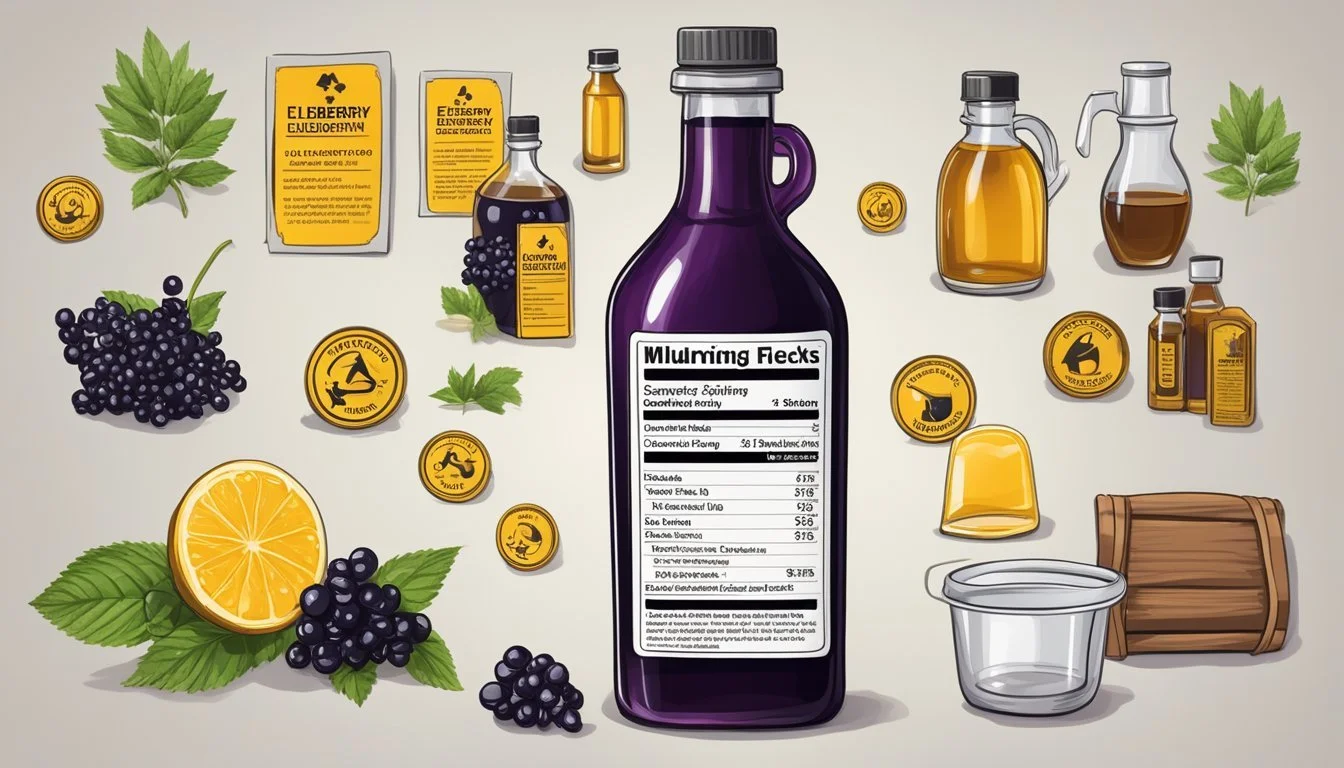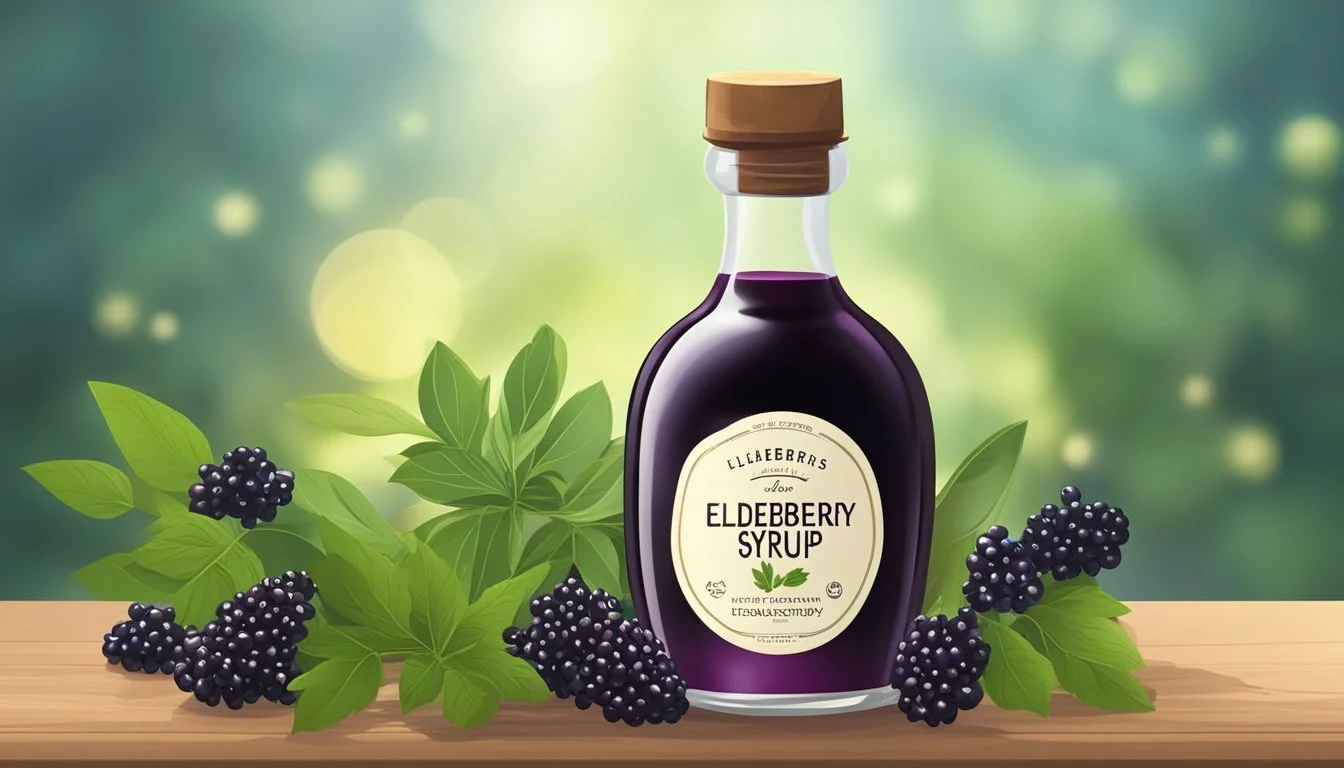The Truth About the Health Benefits of Elderberry Syrup
Separating Fact from Fiction
The health benefits of elderberry syrup have been the subject of numerous discussions among health enthusiasts. Elderberries are known for their rich nutritional profile, particularly their high vitamin C content, and have been traditionally used to help ease cold and flu symptoms. As a supplement, elderberry syrup has been credited with the potential to bolster the immune system due to its antioxidant properties.
Scientific investigations into elderberry syrup have provided some evidence in support of its health benefits, such as reducing the severity and duration of colds, although these findings are not universal. There is also interest in the syrup's possible anti-inflammatory and anti-viral effects, which are thought to arise from the compounds naturally present in the berries. Despite anecdotal claims, the extent to which elderberry syrup may impact overall health, including its alleged ability to reduce cholesterol levels and lower cancer risk, still requires more rigorous research to substantiate these benefits.
What Is Elderberry?
Elderberry refers to the fruit of the Sambucus tree, a plant renowned for its purported health benefits and often used in traditional medicine across various cultures.
Botanical Background
The Sambucus is a genus of flowering plants in the family Adoxaceae. Commonly referred to as elder or elderberry, it comprises a variety of species of shrubs and small trees. One of the most prominent and widely recognized species is the Sambucus nigra, or black elder. Native to Europe, but found globally, these plants are versatile and can adapt to a range of conditions although they primarily thrive in well-drained, fertile soils.
Elderberry Varieties
While the most well-known variety is Sambucus nigra, there are several species of elderberry, including:
Sambucus canadensis: Also known as the American elder, this variety is common in the eastern regions of North America.
Sambucus australasica: The Australian elder, typically found in the Southern Hemisphere.
Sambucus latipinna: Common in the North American southwest.
Sambucus nigra: The European elder or black elder, which is prevalent across Europe.
Each variety yields clusters of small, purplish-black fruits when mature. These fruits are a rich source of nutrients and are frequently harvested for culinary and medicinal purposes.
Elderberry Syrup Composition
Elderberry syrup harnesses the nutritional properties of elderberries, primarily lauded for their vitamin C content and antioxidant capacity. The syrup format often combines elderberry extract with other ingredients that may enhance its nutrient profile.
Vital Nutrients in Syrup
Elderberry syrup is rich in vitamin C, a nutrient vital for immune function, and is packed with antioxidants, which help protect the body against oxidative stress. Additionally, the syrup offers varying amounts of fiber, which aids in digestion, and supplies a small quantity of protein. Trace elements include iron, required for blood formation, calcium for bone health, and potassium to maintain electrolyte balance. All these nutrients contribute to the overall health-promoting potential of elderberry syrup.
Vitamin C: Approximately 58% of the recommended daily value in one cup
Antioxidants: Help in the prevention of cellular damage
Fiber: Aids in digestive health
Protein: Essential for bodily repair and growth
Iron, Calcium, Potassium: Important minerals for various body functions
Elderberry Syrup vs. Other Forms
Compared to other forms like fresh berries or elderberry tea, the syrup often has a concentration of the fruit’s extracts, potentially offering a more potent dose of nutrients and antioxidants in a smaller serving. This makes the syrup a convenient option for those seeking to incorporate the benefits of elderberries into their diet without consuming the fruit in its natural form. The syrup formulation typically includes additional ingredients like sweeteners that may alter the nutritional profile, so users are encouraged to review labels for an accurate nutrient representation.
Fresh Elderberries: Contain 106 calories and 26.7 grams of carbohydrates per cup, and minimal fat and protein
Elderberry Syrup: More concentrated, with additional ingredients that may change nutrient values
Health Benefits of Elderberry Syrup
Elderberry syrup is often recognized for its potential support of the immune system and its role in possibly reducing the duration and severity of cold and flu symptoms. Below is a look at some of the specific properties that contribute to these benefits.
Immune System Support
Elderberries contain high levels of vitamins, such as vitamin C, and antioxidants that may bolster the immune system. Antioxidants help counteract oxidative stress in the body which is a crucial factor in immune health. Studies suggest that the anthocyanins found in elderberries are primarily responsible for their immune-boosting effects.
Nutrient Potential Benefit Vitamin C Supports various cellular functions of the immune system Antioxidants Protect cells from oxidative damage
Effect on Cold and Flu
The use of elderberry syrup as a remedy for cold and flu symptoms has been studied to some extent. Research indicates that elderberry can reduce the symptoms of influenza and colds, possibly due to its antiviral properties. Elderberry's compounds may interfere with the virus's entry and replication in human cells.
Cold: Elderberry syrup has been suggested to shorten the duration of cold symptoms.
Flu: It may also reduce influenza symptoms and the severity of these infections.
However, despite promising results, more extensive and consistent clinical trials are needed to conclusively determine the efficacy of elderberry syrup in fighting respiratory infections.
Potential Risks and Side Effects
While elderberry syrup is known for its potential health benefits, individuals should be aware of the possible risks and side effects associated with its consumption. It is particularly important to consider the form in which elderberries are consumed and potential interactions with medications and specific health conditions.
Toxicity Concerns
Raw elderberries, as well as the leaves, seeds, and bark of the elder tree, contain compounds known as cyanogenic glycosides, which can cause toxic effects if ingested. To avoid this risk, elderberries must be properly cooked to deactivate these compounds. Symptoms of elderberry toxicity can include nausea, vomiting, and severe diarrhea.
Adverse Reactions and Interactions
Elderberry syrup may interact with certain medications, particularly those for treating diabetes, as it could potentially alter blood sugar levels. People who are pregnant or breastfeeding should also exercise caution and consult healthcare providers before use due to insufficient data on safety in these populations. As with many supplements, there can be a risk of allergic reactions or other side effects, so it is crucial for individuals to be attentive to their body's response to elderberry syrup.
Elderberry Syrup and Chronic Conditions
Elderberry syrup is under investigation for its potential benefits in managing chronic conditions due to its nutritional composition, which includes anti-inflammatory compounds and antioxidants. However, it is essential to distinguish between traditional uses and evidence-based findings.
Elderberry's Influence on Inflammation
Elderberries contain anthocyanins, which are compounds with anti-inflammatory properties. Research suggests that these compounds may help modulate the body's inflammatory response. While inflammation is an immune system response to infection or injury, chronic inflammation can lead to various health issues, including some forms of cancer. Elderberry's anti-inflammatory effects could theoretically be beneficial, yet clinical trials are needed to substantiate these claims.
Elderberry and Heart Health
Components in elderberry syrup, such as flavonoids, have been associated with a positive impact on heart health. They may help in reducing cholesterol levels and improving blood vessel function, which can be beneficial against heart disease. Additionally, elderberry has been noted for its potential diuretic effect, which helps in managing blood pressure. However, rigorous scientific studies are necessary to confirm the syrup's effectiveness in preventing or treating heart conditions.
Elderberry in Folk Medicine and Science
Elderberry syrup has long been a staple in folk medicine, purported to offer a multitude of health benefits. Contemporary science has begun to test these claims, providing a clearer picture of the efficacy of elderberry.
Traditional Uses of Elderberry
In traditional folk medicine practices, elderberry has played a significant role as a natural remedy for various ailments. It has most commonly been utilized to combat colds and the flu. The berry is considered to have immune-boosting properties, which is why it's often found in the form of syrups and tinctures. Communities globally have turned to elderberry as a standard support against respiratory infections, with the belief that it can alleviate symptoms and shorten illness duration.
Research and Clinical Studies
The National Center for Complementary and Integrative Health acknowledges the widespread use of elderberry for colds, flu, and even sinus issues. However, research into the effects of elderberry syrup, particularly on viruses like COVID-19, has been limited and inconclusive. Scientific investigations have produced some evidence that suggests elderberry can reduce the severity of flu symptoms when taken within the first 48 hours of onset.
Clinical studies have further examined elderberry's role in immune response. One study highlighted in search results reports that elderberry has high vitamin C content, an antioxidant known for its immune support. Despite these findings, rigorous and expansive clinical trials are necessary to substantiate claims of its effectiveness as a remedy across a larger population. Additionally, science cautions against relying solely on elderberry syrup to safeguard against infectious diseases, stressing it should complement other health measures.
Consumption and Use
Elderberry syrup has become popular for its health benefits, but understanding the proper ways to consume and use it is crucial for maximizing its potential.
How to Take Elderberry Syrup
One typically consumes elderberry syrup orally, with common dosages ranging from 1 teaspoon (5 mL) to 1 tablespoon (15 mL) at a time. The syrup is often used during cold and flu season as a means to possibly support immune health. Elderberry supplements also come in various forms, such as gummies, teas, lozenges, and capsules, for ease of use and convenience.
Syrups and Gummies: Ideal for daily intake, usually before meals.
Teas: Made by steeping elderberry or elderflower.
Lozenges: Can be used for soothing throat irritation.
Capsules: Offer a concentrated dose; check labeling for specific dosages.
It is important to adhere to the recommended dosage provided on the product label or by a healthcare provider to avoid potential side effects.
Dietary Integration and Recipes
Elderberries can be integrated into one's diet beyond medicinal use in the form of juice, tea, or even incorporated into food items like pie or wine. Elderberry extracts are available for those looking for a more concentrated form of the berry's nutrients. Here are some specific ways elderberry is integrated into dietary practices:
Juice: Often diluted with other juices or water.
Tea: Served hot, sometimes with lemon or other herbs for flavor.
Pie/Wine: Used in cooking and baking for its flavor and potential health benefits.
Extracts: Added to foods or beverages for an extra nutrient boost.
Incorporating elderberry should be approached with care, ensuring that these ingredients are properly prepared, as raw elderberries may be toxic if ingested.
Additional Considerations
When exploring the health benefits of elderberry syrup, certain groups and supplement characteristics merit particular attention to ensure both safety and efficacy.
Elderberry for Specific Populations
Pregnant Women: It is essential for pregnant women to consult healthcare providers before consuming elderberry products. The effects on this demographic are not extensively studied, hence caution is advised.
Air Travelers: Individuals who frequently travel by air may consider elderberry supplements to potentially bolster their immune systems, possibly mitigating the severity and duration of colds. However, evidence specific to this population is limited.
Supplement Safety and Quality
Ingredient Purity: Consumers should look for supplements with high-quality elderberry extracts to ensure maximum nutrition and safety. Low-quality supplements may not provide the desired health benefits and could contain harmful additives.
Nutritional Composition: High-quality supplements should contain the beneficial components of elderberries, such as vitamin C, dietary fiber, and antioxidants, without unnecessary fillers or high levels of fat.
Regulatory Oversight: Dietary supplements, including elderberry products, are not as strictly regulated as pharmaceuticals. This necessitates vigilance regarding the safety and quality of these products. Labels and third-party testing can be indicative of quality.
Safety Profiles: Elderberry supplements and syrups, while generally safe for many, can have side effects or interact with medications. A healthcare provider can advise on the appropriateness of use, considering an individual's overall diet, health status, and nutrition.
Elderberry and Overall Wellness
Elderberries bring a wealth of nutritional benefits that may contribute to overall wellness, supporting the body's defenses, and promoting balance.
Elderberry and Nutritional Balance
Elderberries are noteworthy for their nutritional profile. Rich in vitamin C, these berries facilitate the maintenance of a robust immune system. A cup of elderberries contains on average 52.2 milligrams of vitamin C which is pivotal for combating free radicals and reducing oxidative stress. They also possess a high antioxidant capacity, which plays a role in neutralizing harmful free radicals, possibly mitigating the onset of certain illnesses.
Additionally, elderberries contain fiber, with nearly 10.2 grams per cup, contributing to regular digestion and fostering a healthy diet. Overall, these nutrients are essential for maintaining a range of body functions while also potentially contributing to a better complexion and aging process.
Lifestyle and Preventive Health
Integrating elderberry into one's lifestyle as a part of preventive health strategies may lead to beneficial outcomes. The antioxidants present in elderberries can support individuals in managing stress — a common precursor to various health issues. Elderberries' impact on the immune system is often highlighted, with some evidence suggesting it can offer support during the illness. Its role in managing oxidative stress also suggests it could aid in providing a healthier sleep pattern.
Responsible incorporation of elderberries into a healthy diet may assist in mitigating the frequency and severity of general health concerns such as headaches. However, as with any dietary supplement, elderberry should be used judiciously, respecting recommended dosages and acknowledging that while it is beneficial, it is not a cure-all.
Conclusion
Elderberry syrup has been traditionally used for its potential to alleviate symptoms of colds and flu. Scientific studies have explored its capacity to boost the immune system, due to its high vitamin C content and antioxidant properties. One cup of elderberry contains beneficial nutrients, including 58% of the recommended daily value of vitamin C and is also a source of antioxidants.
While certain claims about elderberry's health benefits are supported by research, it is essential to approach them with a measure of caution. Elderberry products should not be seen as a cure-all or a substitute for medical treatment.
Key Points:
Elderberry may help reduce cold and flu symptoms.
It is high in vitamin C and antioxidants.
Should be used to complement, not replace, traditional medical remedies.
Consumers are encouraged to consult with healthcare professionals before starting any new supplement regimen. It is also important to note that the quality and concentration of elderberry supplements can vary greatly, so selecting a reliable source is crucial. In sum, elderberry syrup could be a beneficial addition to one's health practices, when used appropriately and in moderation.







